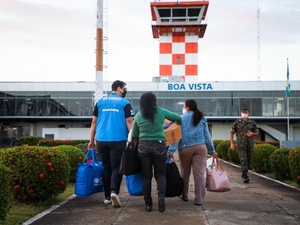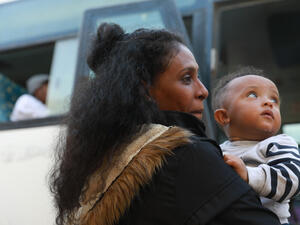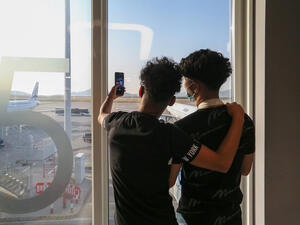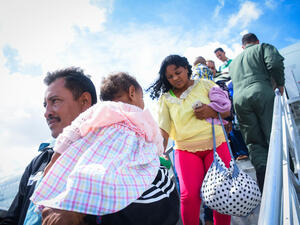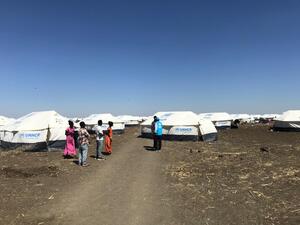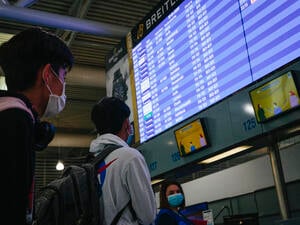UNHCR races to transfer Sudanese refugees as border raids increase
UNHCR races to transfer Sudanese refugees as border raids increase

Young Sudanese refugees braving a sandstorm and the risk of militia attacks in Bamina, eastern Chad.
ABECHE, Chad, March 12 (UNHCR) - The UN refugee agency is speeding up the relocation of tens of thousands of Sudanese refugees in eastern Chad and working to reunite separated refugee children with their families amid increasing militia raids along the Chad-Sudan border.
While the situation has always been precarious for some 110,000 Sudanese refugees living on the border since fleeing the Darfur region last spring, the increasing frequency of cross-border raids by militia from Sudan have made it all the more urgent to move these refugees to safer sites further inland.
In the last month and a half, the militia have been crossing into eastern Chad almost every day to steal the refugees' livestock. The latest major incident happened on Sunday when 35 armed men attacked border sites at Ouendalou and Absogo and stole 100 head of cattle, according to the refugees. One refugee was killed near his hut in Ouendalou while another was wounded in Absogo.
Rising numbers of such incursions have also been reported further to the south, in the Ade region.
To date, UNHCR has transferred more than 10,000 Sudanese refugees from their makeshift settlements near the border to camps further inland in eastern Chad. The agency is speeding up the move by increasing convoys to an existing camp and readying more sites to accommodate the refugees.
Starting Monday, convoys to Farchana camp will resume on a daily basis, following considerable improvements in water supply at the site that now has four boreholes and two new wells to provide water for 6,000 people. Farchana currently hosts 2,199 refugees.
Transfers are also ongoing between the border and camps at Touloum and Kouloungo, home to 5,712 and 2,580 refugees respectively.
New camps are being finalised at Mille and Goz Amer, with transfers expected to start in the next 10 days. UNHCR is also exploring two sites at Abdi Hadjelidje and Iridiba, which should be ready to receive refugees in the coming weeks. Altogether, these new camps can accommodate more than 30,000 refugees.
UNHCR hopes to relocate 60,000 Sudanese refugees to inland camps before the end of May, when the rainy season will make roads impassable to heavy vehicles.
Meanwhile, in the northern town of Bahai, the refugee agency has registered 53 unaccompanied children aged from two to 18 who were separated from their families when they fled fighting in Darfur in late January and early February.
One of them, a nine-year-old boy, recalled what happened in his village: "I was with my father and mother in the field watching the cattle. A plane bombed the whole area. I saw my father fall on the ground, and ran away from the bombings. I don't know if he is still alive, and I don't know where my mother is. I met with other boys who did not know where their parents were either. We decided to stay together and started to walk. We met with older boys from our village, who warned us that the militia could kidnap us to enrol us in their groups if they find us. So we all decided to walk towards Chad."
Five of the children have already found their parents along the border between Bahai and Tine. UNHCR is working with the local authorities to trace the other families in refugee sites along the border, and with the International Committee of the Red Cross to facilitate family reunification between Chad and Sudan.


